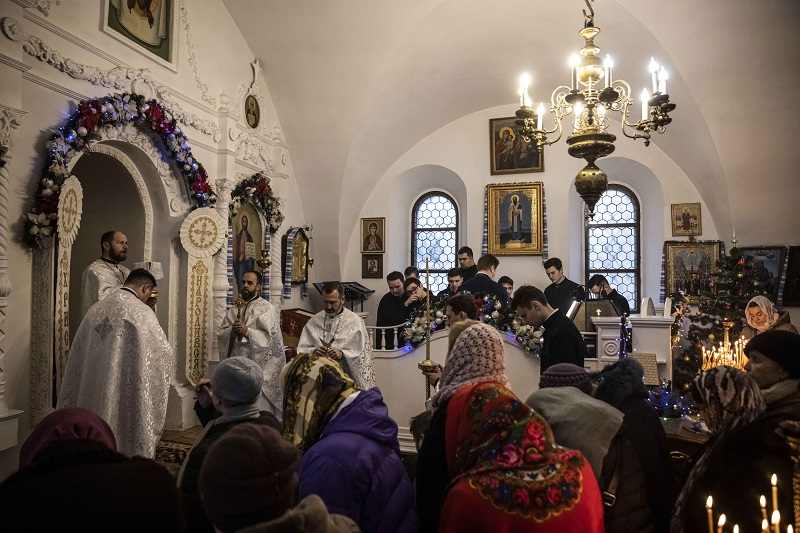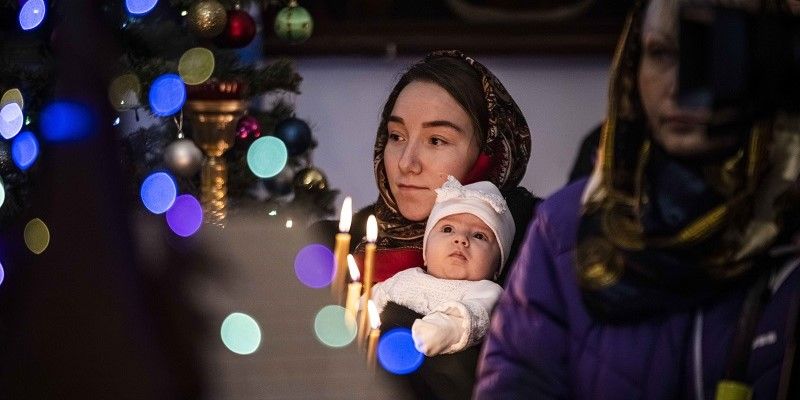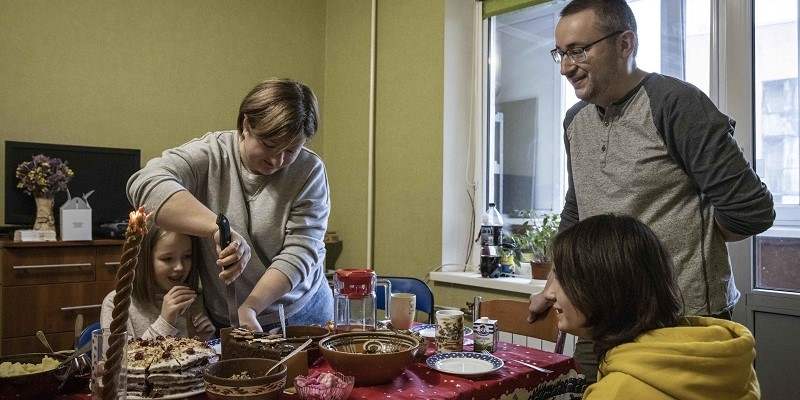
Orthodox Christians celebrate Christmas for the first time on Dec. 25 at a church in Dnipro, Ukraine.
12:47 JST, December 26, 2022
KYIV, Ukraine – Nadiya Zalenetska rushed into the small chapel with a pink bundle in her arms – her 2-month-old daughter, Lyubov, wrapped in a thick blanket. Zalenetska had covered her hair with a red shawl, fitting for a Christmas she was observing two weeks earlier than she ever had before.
Like many Ukrainians, Zalenetska had always known Christmas Day as Jan. 7, according to the Julian calendar used by the Russian and Ukrainian branches of the Orthodox Church. But a movement to reject everything associated with Russia, 10 months into its invasion of Ukraine, has begun to transform even the most sacred traditions.

Nadiya Zalenetska and 2-month-old daughter Lyubov attend a Christmas service at a chapel on the grounds of St. Michael’s Golden-Domed Monastery, on Dec. 25 in Kyiv, Ukraine.
Many Ukrainians are embracing Dec. 25 as Christmas for the first time, reflecting a desire to be more like the West and less like their assailants.
A poll conducted in the Diia smartphone application – which most Ukrainians use to store their personal documents and access public services – asked what date people prefer for Christmas. Nearly 60 percent (of some 383,000 respondents) chose Dec. 25. The Jan. 7 date came in second.
“This is our new tradition,” the 26-year-old Zalenetska said. “We don’t want to do the same thing that Russia does. So much of the world celebrates on Dec. 25, so we will, too.”
In remarks to Congress during a visit to Washington this past week, Ukrainian President Volodymyr Zelensky alluded to the emergent tradition. “[I]n two days we will celebrate Christmas,” he said. “Maybe candlelit. Not because it’s more romantic, no, but because there will not be, there will be no electricity.”
Christian leaders abroad shared Christmas messages of support for Ukraine. In an annual message delivered from a balcony over St. Peter’s Square in the Vatican, Pope Francis called for solidarity with “Ukrainian brothers and sisters who are experiencing this Christmas in the dark and cold.”
In a Christmas miracle – or just a holiday gift from the authorities – Sunday was a rare day without power outages across the city, made necessary by repeated Russian missile strikes targeting critical infrastructure. But other parts of the country remained without power. Ukrainians “must be with electricity today! Maybe not all of the time, but enough for this crazy timeline. Merry Christmas,” Sergey Kovalenko, the CEO of the YASNO energy provider, said on Facebook.
The Ukrainian government made Dec. 25 a national holiday in 2017. A few years later, in 2020, Metropolitan Epiphanius, the leader of the Orthodox Church of Ukraine, suggested he would be open to moving the celebration formally if adherents supported doing so. After Russia’s invasion of Ukraine, that movement gained steam, and the Orthodox Church of Ukraine officially granted permission in October for dioceses to hold Christmas services on Dec. 25.
On the grounds of central Kyiv’s St. Michael’s Golden-Domed Monastery, the church’s first Dec. 24 and 25 Christmas services were held at a small, white rectory, where Zalenetska’s young family squeezed through a crowd to light a candle and whisper a prayer. Even as air-aid alerts rang throughout the capital on Sunday morning – a sound heard across the country – people remained in place.
“On December 25th, about a hundred years ago, a prayer was heard in this church,” Archpriest Vitaly Klos said during the service. “Today we restore historical justice. . . . I wanted to emphasize that the date, when to celebrate, should not prevail in our hearts, but what we celebrate and whom we glorify. It can be the 25th or January 7th.”
“Russia will not take away the joy of Christ’s birth from us,” Klos said.
Most Ukrainians identify as Orthodox Christian, according to the Pew Research Center. But for the past three years, they have been divided between two similarly named bodies: the “self-governing” Ukrainian Orthodox Church, aligned with the Russian Orthodox Church, and the Orthodox Church of Ukraine, which split off in 2018 to create a fully independent ecclesiastical entity.
Once viewed as an influential force for Russian propaganda in Ukraine, the Ukrainian Orthodox Church of the Moscow Patriarchate has waned in popularity since the start of the war. Even after the Ukrainian Orthodox Church formally distanced itself from the Moscow Patriarchate in May over its support for the war, Kyiv has repeatedly accused its clergy of loyalty to Russia.
Earlier this month, Zelensky said his administration would draft a law “making it impossible for religious organizations affiliated with centers of influence in the Russian Federation to operate in Ukraine.” He also ordered a probe into the Ukrainian Orthodox Church.
Ukrainian authorities arrested dozens of priests this fall for allegedly helping Russia, including by providing information to Russia’s military. Ukraine’s main internal security service, the SBU, raided monasteries and churches across the country in search of evidence. SBU officials said some raids unearthed pro-Kremlin reading material.
The Ukrainian Orthodox Church has rejected accusations of collaboration with Russia as “unproven and groundless.”
In Moscow, meanwhile, Patriarch Kirill, head of the Russian Orthodox Church, has been one of the war’s most prominent backers, delivering sermons extolling its virtues. Kirill, a close ally of Russian President Vladimir Putin, has played a key role in providing faith-based justifications for Russia’s expansionist aims – in particular, advancing the notion of “Ruskiy Mir,” a Russian word for the “Russian world” – encompassing Ukraine.
It’s disdain for that very Ruskiy Mir concept that’s inspired many Ukrainians to turn away from a Jan. 7 Christmas celebration.
“It was the Soviet Union that destroyed Christianity inside of it and Ukrainian culture,” said 16-year-old Sasha Deschenko, who celebrated Christmas on Dec. 25 with her family for the first time this year. “Now we are claiming our culture and traditions back.”
Tetyana Deschenko, Sasha’s mother, long considered switching to a Dec. 25 Christmas. After part of her family had to live under Russian occupation earlier this year – her husband’s relative was killed by Russian soldiers in the Kyiv region on Feb. 25, she says – the decision became simple. On Sunday, the family of four ate a Christmas meal on a table with a red tablecloth decorated with images of snowmen and Santa Claus. Tetyana made kutia, a traditional Ukrainian Christmas dish of sweetened grains – Sasha’s favorite.
“I called my mother yesterday and said, ‘What kind of Christmas is this? Like a Catholic one?'” Tetyana said. “But later she said that her grandmother always wished her a merry Christmas on the 25th. I just don’t want any joint holidays with Russia.”
But not everyone is ready to accept Dec. 25 – and the divide is often generational. Some said they would celebrate both the December and January dates.
Walking past a Christmas tree market in Dnipro last week, Liudmila Kravchenko, 71, a widower, said there is much Ukraine can learn from Europe – such as rule of law and how to organize a government. But she said she did not approve of switching the date of Christmas, and expressed concern that the cultural changes risked transforming the country too much.
“I don’t like it. The west is the west,” Kravchenko said. “We were born here. If it’s for foreign policy, it’s one thing but it’s another for the holidays.”
Just down the street, Danylo Marchuk, 21, and a handful of friends canvassed the street collecting donations for displaced Ukrainians. They were doing so on behalf of the youth chapter of the European Party of Ukraine, a political party urging closer ties with the European Union. Marchuk said he celebrates Christmas on the traditional date with his family at home, but he and his friends started celebrating on Dec. 25 last year.
“It’s more a Soviet tradition,” he said of the old date. “The 25th is new, and something we’re looking forward to seeing going forward. The youth know what we’re doing, and we’re going toward Europe, and we do want to live in Europe.”

Tetyana and Dmytro Deschenko and their daughters Sasha (16) and Anastacia (8) enjoy a traditional Christmas lunch in their apartment on Dec. 25 in Kyiv, Ukraine.
Top Articles in News Services
-

Survey Shows False Election Info Perceived as True
-

Prudential Life Expected to Face Inspection over Fraud
-

Hong Kong Ex-Publisher Jimmy Lai’s Sentence Raises International Outcry as China Defends It
-

Japan’s Nikkei Stock Average Touches 58,000 as Yen, Jgbs Rally on Election Fallout (UPDATE 1)
-

Japan’s Nikkei Stock Average Falls as US-Iran Tensions Unsettle Investors (UPDATE 1)
JN ACCESS RANKING
-

Japan PM Takaichi’s Cabinet Resigns en Masse
-

Japan Institute to Use Domestic Commercial Optical Lattice Clock to Set Japan Standard Time
-

Israeli Ambassador to Japan Speaks about Japan’s Role in the Reconstruction of Gaza
-

Man Infected with Measles Reportedly Dined at Restaurant in Tokyo Station
-

Videos Plagiarized, Reposted with False Subtitles Claiming ‘Ryukyu Belongs to China’; Anti-China False Information Also Posted in Japan
























